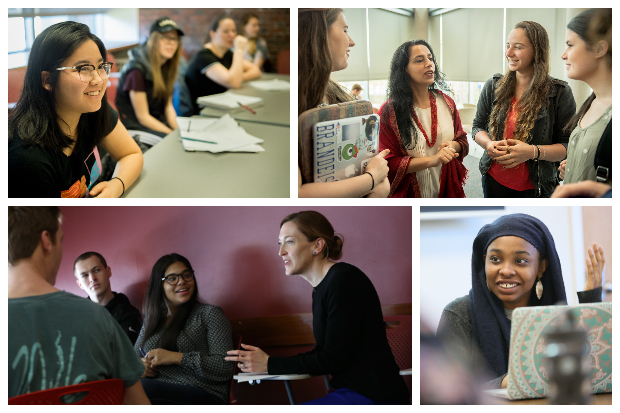Decades in the making, women's, gender and sexuality studies is now a department

Faculty and students engage in discussion in WGS courses in 2017 and 2018.
Like many pioneering academic programs created over the past decades, women’s studies at Brandeis struggled to win recognition and acceptance.
Founded in 1975, the fledgling program had scant resources and recognition. Some faculty even questioned its value. Convincing the administration to provide a typewriter and a dedicated phone line was an uphill fight for the program, now called women’s, gender and sexuality studies.
Well into the computer era, Joyce Antler, the Samuel J. Lane Professor Emerita of American Jewish History and Culture and Professor Emerita of Women's, Gender and Sexuality Studies, long kept a portable red typewriter in her Brandeis office as a reminder of how difficult it was to acquire.
Antler, who chaired women’s studies from 1980-1991, recalled that "the program wasn't treated badly, it was hardly considered at all."
“At first there was no budget — the idea of having a budget outside of departments was very new,” she said.
A lot has changed for women’s, gender and sexuality studies since the 1970s. This summer it shed its interdepartmental program status, officially becoming an academic department, approved by the Board of Trustees and the faculty senate.
The truth is, the program had functioned like a department for some time, said professor Sarah Lamb, who was program chair during the 2019-20 academic year and oversaw its change to a department.
"Becoming a department won’t change how WGS works for students, for instance, but it does add more prestige, and shows how Brandeis is on the cutting edge for recognizing women’s, gender, and sexuality studies as a vital field of study," Lamb said.
Dean of Arts and Sciences Dorothy Hodgson helped usher in departmental status. Before coming to Brandeis, Hodgson had been at Rutgers University, where women's, gender, and sexuality studies had recently gained department status.
"When Dorothy came, she saw we had tenured faculty in WGS, a graduate program, a national board, a major and minor,” Lamb said. “She recognized that we were functioning quite like a department and invited us to consider trying to become one.”
In July, professor ChaeRan Freeze, the Francis and Max Elkon Chair of Modern Jewish History, was appointed chair of the Department of Women’s, Gender, and Sexuality Studies.
“The rebirth of WGS as a full-fledged department represents Brandeis' commitment to its ideals of social justice,” Freeze said. “Feminist scholarship, teaching and activism have long been at the forefront of critiquing structural inequalities by centering the experiences of the most marginalized people and advocating for radical transformation, especially at this moment in history.”
Founded during an era when similar women’s studies programs were being started at many universities, WGS launched with one class, while creating a minor within a few years. It grew over the years, deepening connections with other programs and departments across campus, and becoming in 1992 a founding member with other Boston-area institutions of a group now called the Consortium for Graduate Studies in Gender, Culture, Women, and Sexuality.
Professor Emerita of Comparative Literature, English and WGS Sue Lanser, hired to lead the program in 2001, was critical in structuring WGS in a way that eventually led to its status as a department.
"She's the one who really began developing WGS at Brandeis in a department-like way," Lamb said. "Sue recruited Brandeis faculty from various departments to become WGS core faculty, committed to teaching, advising and leadership."
Lanser and Professor Emerita of Sociology Shulamit Reinharz also developed a vibrant WGS National Board, whose financial support makes cutting-edge programming and student scholarships possible, Lamb said.
Today, women’s, gender and sexuality studies is composed of 20 core faculty, including several whose tenure lines are situated in WGS jointly with another department. It offers an undergraduate major, two minors, a master’s program, and joint master’s programs with eight other disciplines.
WGS has maintained and grown over the years thanks to the faculty who devoted their time, including Lamb, previously a full-time anthropology professor who has now switched part of her tenure line to the new WGS department.
"I have wanted to be a part of WGS over the years because it's intellectually stimulating and socially vibrant," Lamb said. "I get so many good ideas from my faculty colleagues, and I love interacting with the WGS students."
That dedication has always been a part of WGS’s fabric, according to Antler.
"We were creating new ways of teaching at the undergraduate and graduate levels,” Antler said, and the program grew exponentially, making a name with its pioneering faculty and courses. “There was a time when some faculty on campus questioned its existence. Its vitality and leadership are certainly not questioned now."
Categories: Alumni, Humanities and Social Sciences, Research, Student Life





